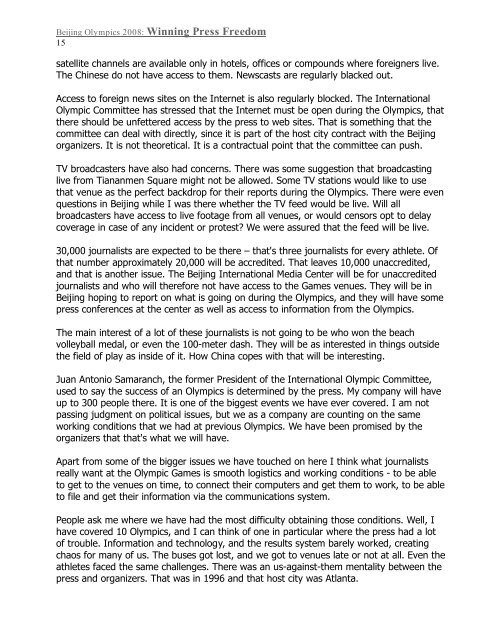Beijing Olympics 2008: Winning Press Freedom - World Press ...
Beijing Olympics 2008: Winning Press Freedom - World Press ...
Beijing Olympics 2008: Winning Press Freedom - World Press ...
Create successful ePaper yourself
Turn your PDF publications into a flip-book with our unique Google optimized e-Paper software.
<strong>Beijing</strong> <strong>Olympics</strong> <strong>2008</strong>: <strong>Winning</strong> <strong>Press</strong> <strong>Freedom</strong><br />
15<br />
satellite channels are available only in hotels, offices or compounds where foreigners live.<br />
The Chinese do not have access to them. Newscasts are regularly blacked out.<br />
Access to foreign news sites on the Internet is also regularly blocked. The International<br />
Olympic Committee has stressed that the Internet must be open during the <strong>Olympics</strong>, that<br />
there should be unfettered access by the press to web sites. That is something that the<br />
committee can deal with directly, since it is part of the host city contract with the <strong>Beijing</strong><br />
organizers. It is not theoretical. It is a contractual point that the committee can push.<br />
TV broadcasters have also had concerns. There was some suggestion that broadcasting<br />
live from Tiananmen Square might not be allowed. Some TV stations would like to use<br />
that venue as the perfect backdrop for their reports during the <strong>Olympics</strong>. There were even<br />
questions in <strong>Beijing</strong> while I was there whether the TV feed would be live. Will all<br />
broadcasters have access to live footage from all venues, or would censors opt to delay<br />
coverage in case of any incident or protest? We were assured that the feed will be live.<br />
30,000 journalists are expected to be there – that's three journalists for every athlete. Of<br />
that number approximately 20,000 will be accredited. That leaves 10,000 unaccredited,<br />
and that is another issue. The <strong>Beijing</strong> International Media Center will be for unaccredited<br />
journalists and who will therefore not have access to the Games venues. They will be in<br />
<strong>Beijing</strong> hoping to report on what is going on during the <strong>Olympics</strong>, and they will have some<br />
press conferences at the center as well as access to information from the <strong>Olympics</strong>.<br />
The main interest of a lot of these journalists is not going to be who won the beach<br />
volleyball medal, or even the 100-meter dash. They will be as interested in things outside<br />
the field of play as inside of it. How China copes with that will be interesting.<br />
Juan Antonio Samaranch, the former President of the International Olympic Committee,<br />
used to say the success of an <strong>Olympics</strong> is determined by the press. My company will have<br />
up to 300 people there. It is one of the biggest events we have ever covered. I am not<br />
passing judgment on political issues, but we as a company are counting on the same<br />
working conditions that we had at previous <strong>Olympics</strong>. We have been promised by the<br />
organizers that that's what we will have.<br />
Apart from some of the bigger issues we have touched on here I think what journalists<br />
really want at the Olympic Games is smooth logistics and working conditions - to be able<br />
to get to the venues on time, to connect their computers and get them to work, to be able<br />
to file and get their information via the communications system.<br />
People ask me where we have had the most difficulty obtaining those conditions. Well, I<br />
have covered 10 <strong>Olympics</strong>, and I can think of one in particular where the press had a lot<br />
of trouble. Information and technology, and the results system barely worked, creating<br />
chaos for many of us. The buses got lost, and we got to venues late or not at all. Even the<br />
athletes faced the same challenges. There was an us-against-them mentality between the<br />
press and organizers. That was in 1996 and that host city was Atlanta.





